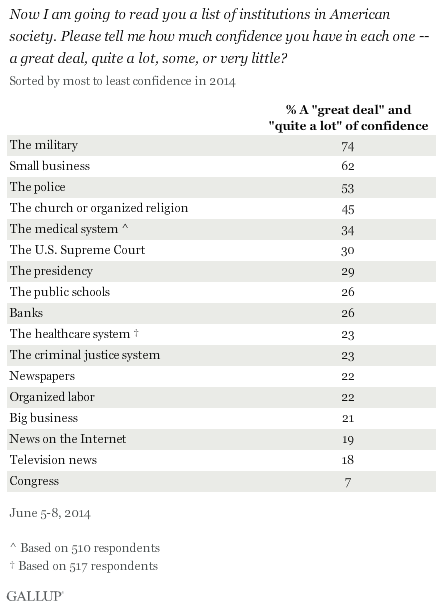SOME CALL IT ‘SOCIAL GLUE’
THOUGHTS ON OUR FADING FAITH IN U.S. INSTITUTIONS

For any society to function effectively, you need a considerable amount of trust. Rules, regulations, and the legal system can only take you so far. Anyway, any society where behavior is that tightly controlled is invariably oppressive and unpleasant to live in. There are so many variations in human behavior and circumstances that you need both flexibility and tolerance to be integral to the the culture—or to put matters another way, common human decency is a must if the business of daily life is to be tolerable.
Trust is the great enabler, and its decline is a case of concern. Because it is an intangible, and we tend to take it for granted, we don’t seem to talk about trust much—but perhaps we have reached the stage where we should. In more than a few cases, public trust in some of our institutions has sunk so low that it is impeding both their functionality—and our way of life.
Public trust has deteriorated to the extent it has for these main reasons:
The performance of the institution—or group of institutions in question. Here, Big Business is a perfect example of a sector which is deservedly held in low esteem. It has violated its social contract in numerous ways, seems to operate without a moral code, and no longer appears to have any regard for the society which allows it to function. Its offenses include overpaying its CEOs, avoiding taxes, financial engineering, exporting jobs by the million, largely removing job security, failure to implement working conditions which are the norm in other developed countries, failure to invest, the arbitrary closure of plants to the detriment of local communities, and massive destruction of the environment. In addition, you can add in numerous ways in which Big Business makes dealing with it unpleasant. These span the gamut from secrecy to quality deficiencies to deceptive practices to rigging the legal system to give it special favors.
Are there exceptions to this rather grim picture? Of course there are. There are many fine companies out there who do an excellent job, look after their employees well, and do a great deal of good for their communities. Nonetheless, it is hard not to have the feeling that they are in a minority. Accordingly, Gallup’s finding that only 21% of people have a great deal of confidence in Big Business seems reasonable.
The second main reason why trust has deteriorated is that there has been a deliberate campaign to undermine trust in government operating since the early Seventies. This has been operated by Right Wing interests for political reasons—and specifically to keep taxes on the rich and on Big Business down—and has been highly successful. It advances the argument that government is inherently less efficient at doing just about anything than the private sector—and therefore the less of it we have the better. The trouble is that the evidence does not support that. Also, there many things which are near impossible to achieve without society cooperating—and the manifestation of such cooperation is government.
Here, I don’t pretend that government is blameless, but merely make the point that government can be highly effective—and is right now in some other countries. In short, the issues of concern should be the caliber of the people in government together with their policies—as opposed to government itself. A further point is that if the proposed alternative to government is Big Business—which is what is normally suggested—one has to wonder on what grounds it should be considered superior.
The third main reason why people’s trust is in decline is because the economic health of most Americans has been slowly deteriorating since the Seventies. For several decades this degradation was scarcely noticed, but the Great Recession and its aftermath have shaken people to the core—and it is now fairly clear that this widespread economic insecurity is contributing to the general sourness that people feel.
A fourth main reason why people are losing faith in U.S institutions has to do with the fact that a great many members of the public are either under-informed or misinformed—and, as such, prone to rely more on prejudice than rational analysis. This relatively high level of ignorance exists for a host of reasons stretching from our inadequate education system to the poor quality of news coverage on national TV, and its effect is significant.
It would be hard to find a better example of widespread ignorance than the high regard in which people people hold the military. Here, no less than 74% of people have a great deal of confidence in it—without making any distinction between the soldiers who do the fighting—and deserve all the support they can get—and the MICC (Military Industrial Congressional Complex) which is deeply corrupt and operates far more for the benefit of its members than the nation as a whole.
It could well be that the problem here lies far more with the question than anything else—in this specific case—but I hold to the view that blind support of the military, without knowing something of the details, is exceedingly dangerous.
It means that:
A supreme irony in relation to our high regard for both the military and police is that both are government institutions. In fact, the military in particular, are run by that very same Federal Government which so many of us profess to despise.
As for the fact that only 7% of people have confidence in Congress, I guess that figure speaks for itself.
VOR words 975

No comments:
Post a Comment